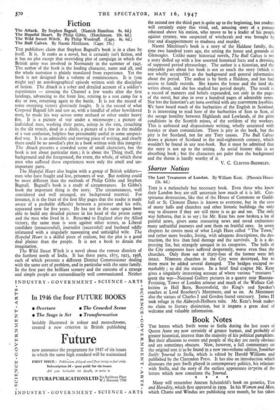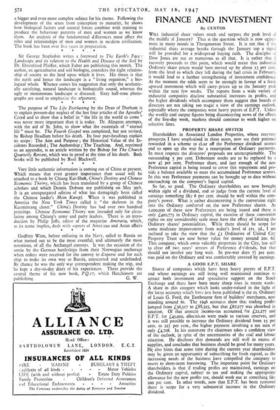Book Notes
THE letters which Swift wrote to Stella during the last years of Queen Anne are now certainly of greater human, and probably of greater historical, interest than the majority.of his political pamphlets. But their allusions to events and people of the day are rarely obvious and are sometimes obscure. Now, however, a full commentary on the original text is to be found in a new two-volume edition, Jonathan Swift: journal to Stella, which is edited- by Harold Williams and published by the Clarendon Press. It has also an introduction which discusses the part Swift played in contemporary politics, his relations with Stella, and the story of the earliest appearance irrprint of the letters which now constitute the Journal.
* * * *
Many will remember Amram Scheinfeld's book on genetics, You and Heredity, which first appeared in 1939. In his Women and Men, which Chatto and Windus are publishing next month, he has. taken
a bigger and even more complex subject for his theme. Following the development of the sexes from conception to maturity, he shows how biological factors and natural forces combine with training to produce the behaviour patterns of men and women as we know them. An analysis of the fundamental differences must affect the roles and relationships of men and women in modern civilisation. The book has been over fis e }ears in preparation. * * Sir George Stapledon writes a foreword to The Earth's. Face : Landscape and its relation to the Health and Disease of the Soil by Dr. Ehrenfried Pfeiffer, which Faber are publishing this month. The author, an agriculturist and soil biologist, considers the right relation- ship of society to the land upon which it lives. His thesis is that the earth and hence the landscape is a " living organism," a bio- logical whole. Whence comes his suggestion that only the aesthetic- ally satisfying, natural landscape is biologically sound, whereas the ugly or monotonous landscape is diseased. Sixty half-tone photo- graphs are used to emphasise the argument.
The purpose of The Life Everlasting by the Dean of Durham is to explain present-day neglect of the last four articles of the Apostles' Creed and to show that a belief in "the life in the world to come " was never more important than it is today. Dr. Alington attempts, with the aid of St. John, to show what the essentials of " eternal life " must be. The Fourth Gospel was completed, but not revised, by Bishop Headlam before his death. Its four part-headings explain its scope: The Aim and Purpose ; the Historical Value of the In- cidents Recorded ; The Authorship ; The Teaching. And, reprinted as an appendix, is an article written by the Bishop for The Church Quarterly Review, which was in proof at the time of his death. Both books will be published by Basil Blackwell. * * * *
Very little authentic information is coming out of China at present. Which means that even greater importance than usual will be attached to a book by Chiang Kai-Shek, China's Destiny and Chinese Economic Theory, which has been translated by a group of Chinese scholars and which Dennis Dobson are publishing on May 3oth. It is an unexpurgated edition of what has damagingly been called the Chinese leader's Mein Kampf. When it was published in America the New York Times called it " the skeleton in the Kuomintang closet." China's Destiny has had over two hundred printings. Chinese Economic Theory was intended only for circu- lation among Chiang's army and party leaders. There is an intro- duction. by Philip Jaffe, editor of the magazine Amerasia, which, as its name implies, deals with aspects of American and Asian affairs
* * * * Godfrey Winn, before enlisting in the Navy, sailed to Russia on what turned out to be the most eventful, and ultimately the most notorious, of all the Archangel convoys. It was the occasion of the sortie by the German battleships from their Norwegian anchorage when orders were received for the convoy to disperse and for each ship to make its own way to Russia, unescorted and undefended. By chance he was the only war correspondent making the trip, and he kept a day-to-day diary of his experiences. These provide the central theme of his new book, P.Q..r7, which Hutchinson are



































 Previous page
Previous page